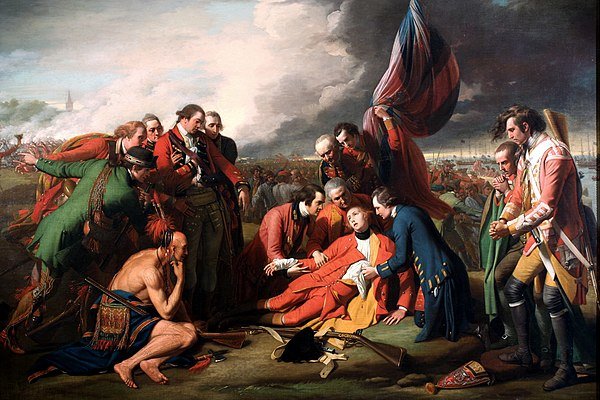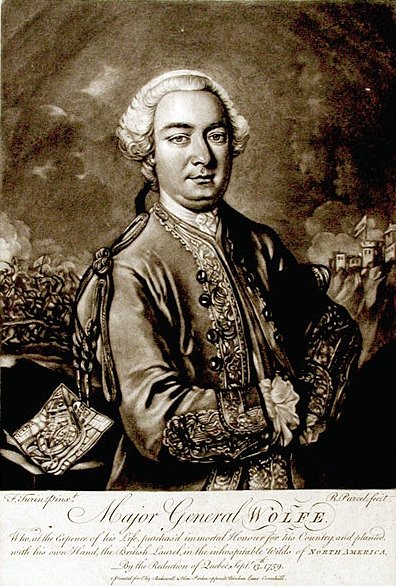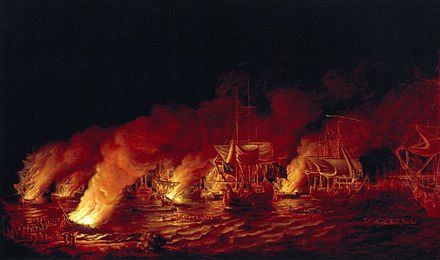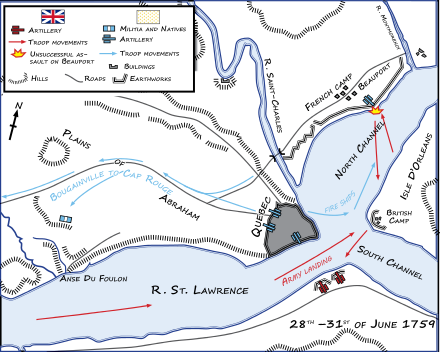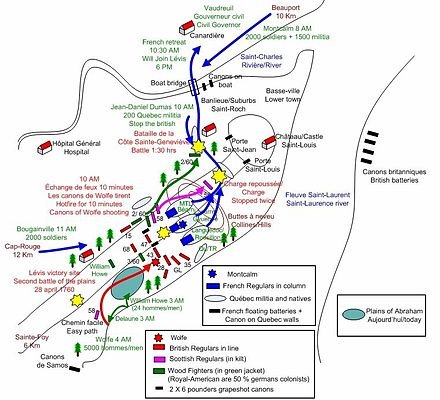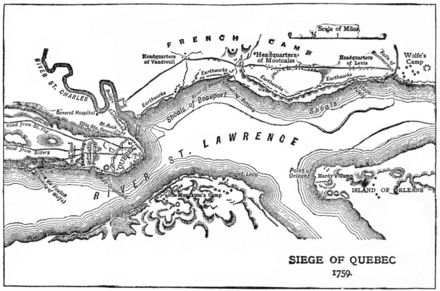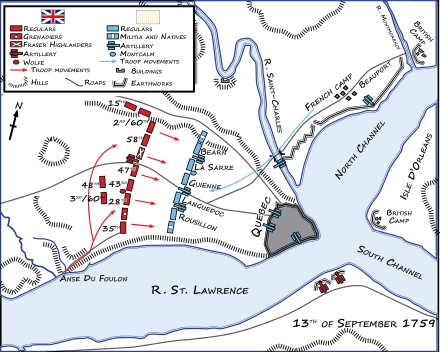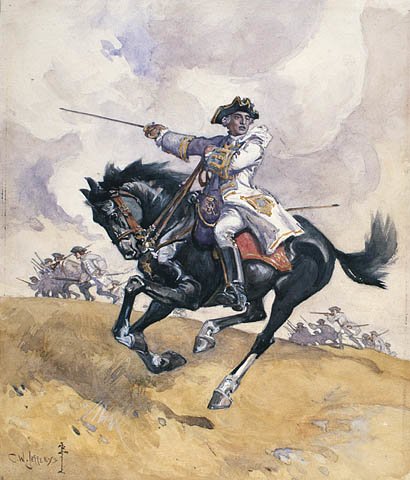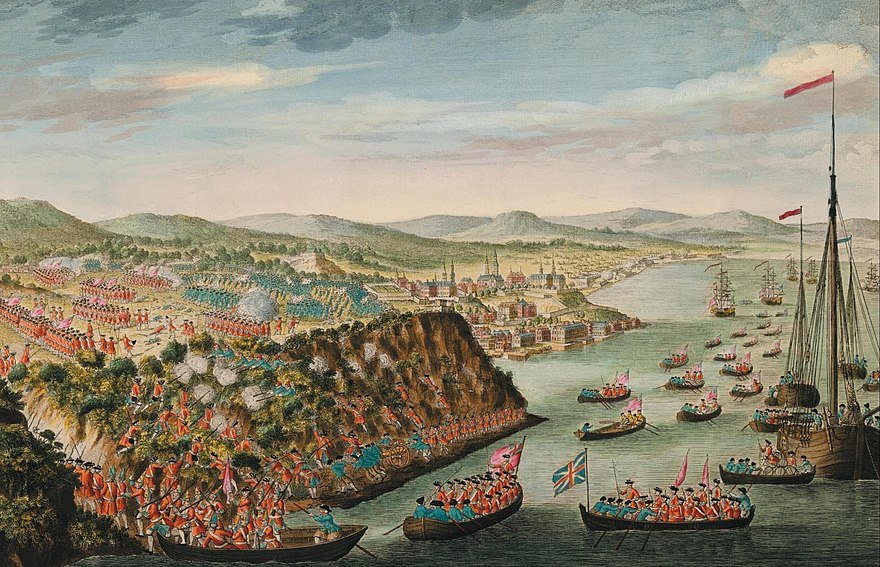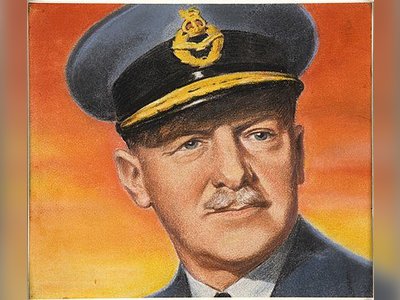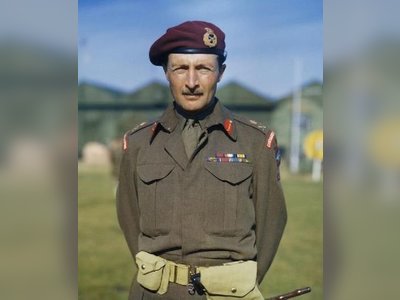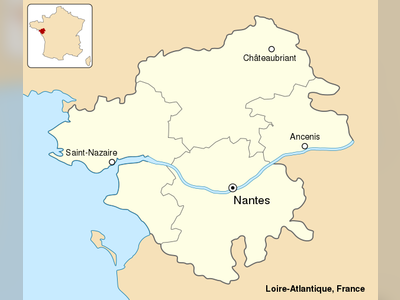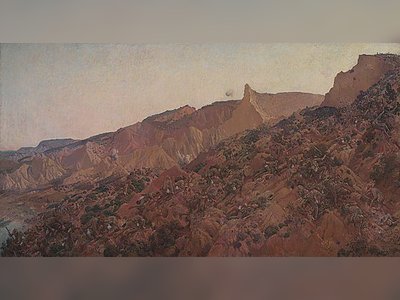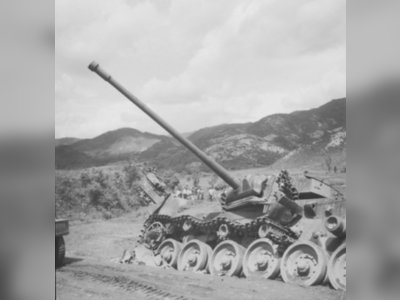British Heritage
Remember, Cherish, Learn.
beta
Battle of the Plains of Abraham
The Pivotal Battle of the Plains of Abraham.
The Battle of the Plains of Abraham, also known as the Battle of Quebec, was a crucial conflict that took place during the Seven Years' War, specifically in the North American theatre known as the French and Indian War. Fought on 13 September 1759 on a plateau just outside the walls of Quebec City, this battle marked a turning point in the struggle between France and Britain for control over New France (now Canada). The battle's significance lies not only in the tactical victory achieved by the British but also in its far-reaching impact on the creation of Canada.
The Battle of the Plains of Abraham is undeniably one of the most significant events in British military history and has left an enduring legacy in the annals of British heritage. The year 1759, in which this pivotal battle took place, became known as the "Annus Mirabilis" or the "Year of Miracles" for Great Britain. The victory at Quebec was one of several extraordinary accomplishments for the British during that year, making it a remarkable and transformative period in British history.
The successful outcome of the battle decisively tilted the balance in favor of the British, leading to the eventual capture of Quebec City and the surrender of French forces. This critical victory paved the way for Britain's subsequent acquisition of most of its possessions in eastern North America through the Treaty of Paris in 1763. The acquisition of vast territories in the New World firmly established Britain as a dominant colonial power and significantly expanded its influence and territorial holdings.
Moreover, the Battle of the Plains of Abraham played a key role in shaping the destiny of Canada. With the capture of Quebec and the defeat of the French, the foundation was laid for the establishment of British rule in the region. The seeds were sown for the emergence of modern Canada as a British dominion and, eventually, as a sovereign nation.
The Battle of the Plains of Abraham was remarkable not only for its relatively small scale, with fewer than 10,000 troops involved, but also for the innovative tactics employed by the British. Under the command of General James Wolfe, the British forces adopted new and unconventional military strategies that proved to be highly effective against the traditional military formations used in most European conflicts. The decision to deploy soldiers in a shallow horseshoe formation and to hold their fire until the French were within close range allowed the British to deliver devastating volleys, inflicting heavy casualties on the enemy and swiftly gaining the upper hand.
Although the battle lasted only about an hour, its outcome was momentous. General Wolfe himself perished on the battlefield, succumbing to three gunshot wounds shortly after the engagement began. His French counterpart, General Louis-Joseph de Montcalm, was also fatally wounded during the battle and died the next day. Despite the losses suffered by both sides, it was the British who emerged victorious, forcing the French to evacuate Quebec City and surrender.
The immediate impact of the battle was the capture of Quebec City and the subsequent surrender of the city's garrison. The French forces would attempt to recapture Quebec the following spring, but their efforts proved futile. In the Battle of Sainte-Foy, the British were forced to retreat within the city walls, but the French could not reclaim the city. Eventually, the 1763 Treaty of Paris solidified British control over most of New France, including Quebec, ending the French presence in eastern North America.
The Battle of the Plains of Abraham was a critical step in the establishment of Canada as a British colony and, ultimately, as a nation. Under British rule, Canada began to evolve politically, socially, and economically. British institutions and customs were gradually integrated into Canadian society, creating a unique blend of British heritage and local identity.
The linguistic and cultural heritage of Quebec also underwent significant changes under British rule. The British respected the rights of the French-speaking population and allowed them to practice their own religion, ensuring a degree of cultural autonomy. This respect for cultural diversity laid the foundation for Canada's modern commitment to multiculturalism and bilingualism.
As Canada grew and progressed, the legacy of the Battle of the Plains of Abraham remained a pivotal moment in its history. The battleground itself, now known as the Plains of Abraham, became a national historic site and a symbol of Canadian heritage. It attracts visitors and historians alike, reminding them of the struggles and sacrifices that shaped the nation.
In conclusion, the Battle of the Plains of Abraham stands as a defining moment in British history, contributing to the rise of British imperialism and the establishment of Canada as a British colony. The success of the British forces on the battlefield and the subsequent capture of Quebec City in 1759 marked a significant turning point in the Seven Years' War and had a profound and lasting impact on the fate of New France. The battle's legacy, coupled with its contribution to British heritage, solidified its place in the history books as a remarkable event that shaped the course of Canada's evolution and identity. The memory of this pivotal battle continues to resonate in Canadian consciousness, making the Plains of Abraham a hallowed ground that preserves the spirit of both British and Canadian heritage.
Legacy and Contribution to British Heritage: The Annus Mirabilis of 1759
The Battle of the Plains of Abraham is undeniably one of the most significant events in British military history and has left an enduring legacy in the annals of British heritage. The year 1759, in which this pivotal battle took place, became known as the "Annus Mirabilis" or the "Year of Miracles" for Great Britain. The victory at Quebec was one of several extraordinary accomplishments for the British during that year, making it a remarkable and transformative period in British history.
The successful outcome of the battle decisively tilted the balance in favor of the British, leading to the eventual capture of Quebec City and the surrender of French forces. This critical victory paved the way for Britain's subsequent acquisition of most of its possessions in eastern North America through the Treaty of Paris in 1763. The acquisition of vast territories in the New World firmly established Britain as a dominant colonial power and significantly expanded its influence and territorial holdings.
Moreover, the Battle of the Plains of Abraham played a key role in shaping the destiny of Canada. With the capture of Quebec and the defeat of the French, the foundation was laid for the establishment of British rule in the region. The seeds were sown for the emergence of modern Canada as a British dominion and, eventually, as a sovereign nation.
The Success and Significance of the Battle
The Battle of the Plains of Abraham was remarkable not only for its relatively small scale, with fewer than 10,000 troops involved, but also for the innovative tactics employed by the British. Under the command of General James Wolfe, the British forces adopted new and unconventional military strategies that proved to be highly effective against the traditional military formations used in most European conflicts. The decision to deploy soldiers in a shallow horseshoe formation and to hold their fire until the French were within close range allowed the British to deliver devastating volleys, inflicting heavy casualties on the enemy and swiftly gaining the upper hand.
Although the battle lasted only about an hour, its outcome was momentous. General Wolfe himself perished on the battlefield, succumbing to three gunshot wounds shortly after the engagement began. His French counterpart, General Louis-Joseph de Montcalm, was also fatally wounded during the battle and died the next day. Despite the losses suffered by both sides, it was the British who emerged victorious, forcing the French to evacuate Quebec City and surrender.
The immediate impact of the battle was the capture of Quebec City and the subsequent surrender of the city's garrison. The French forces would attempt to recapture Quebec the following spring, but their efforts proved futile. In the Battle of Sainte-Foy, the British were forced to retreat within the city walls, but the French could not reclaim the city. Eventually, the 1763 Treaty of Paris solidified British control over most of New France, including Quebec, ending the French presence in eastern North America.
The Creation of Canada and Its Lasting Heritage
The Battle of the Plains of Abraham was a critical step in the establishment of Canada as a British colony and, ultimately, as a nation. Under British rule, Canada began to evolve politically, socially, and economically. British institutions and customs were gradually integrated into Canadian society, creating a unique blend of British heritage and local identity.
The linguistic and cultural heritage of Quebec also underwent significant changes under British rule. The British respected the rights of the French-speaking population and allowed them to practice their own religion, ensuring a degree of cultural autonomy. This respect for cultural diversity laid the foundation for Canada's modern commitment to multiculturalism and bilingualism.
As Canada grew and progressed, the legacy of the Battle of the Plains of Abraham remained a pivotal moment in its history. The battleground itself, now known as the Plains of Abraham, became a national historic site and a symbol of Canadian heritage. It attracts visitors and historians alike, reminding them of the struggles and sacrifices that shaped the nation.
In conclusion, the Battle of the Plains of Abraham stands as a defining moment in British history, contributing to the rise of British imperialism and the establishment of Canada as a British colony. The success of the British forces on the battlefield and the subsequent capture of Quebec City in 1759 marked a significant turning point in the Seven Years' War and had a profound and lasting impact on the fate of New France. The battle's legacy, coupled with its contribution to British heritage, solidified its place in the history books as a remarkable event that shaped the course of Canada's evolution and identity. The memory of this pivotal battle continues to resonate in Canadian consciousness, making the Plains of Abraham a hallowed ground that preserves the spirit of both British and Canadian heritage.
- Battle of the Plains of Abrahamen.wikipedia.org
